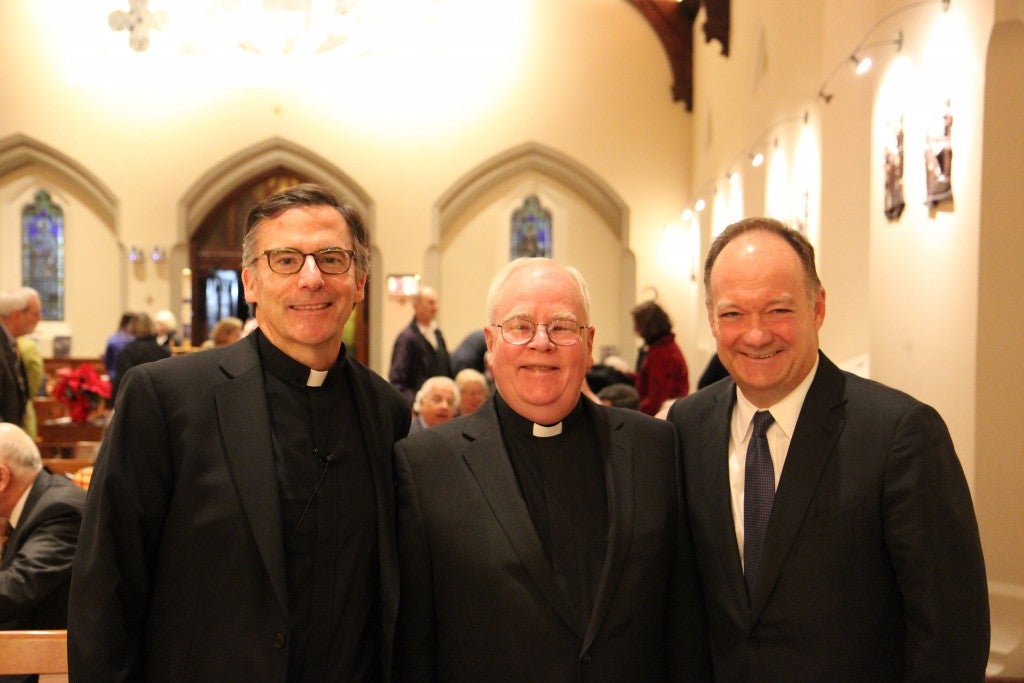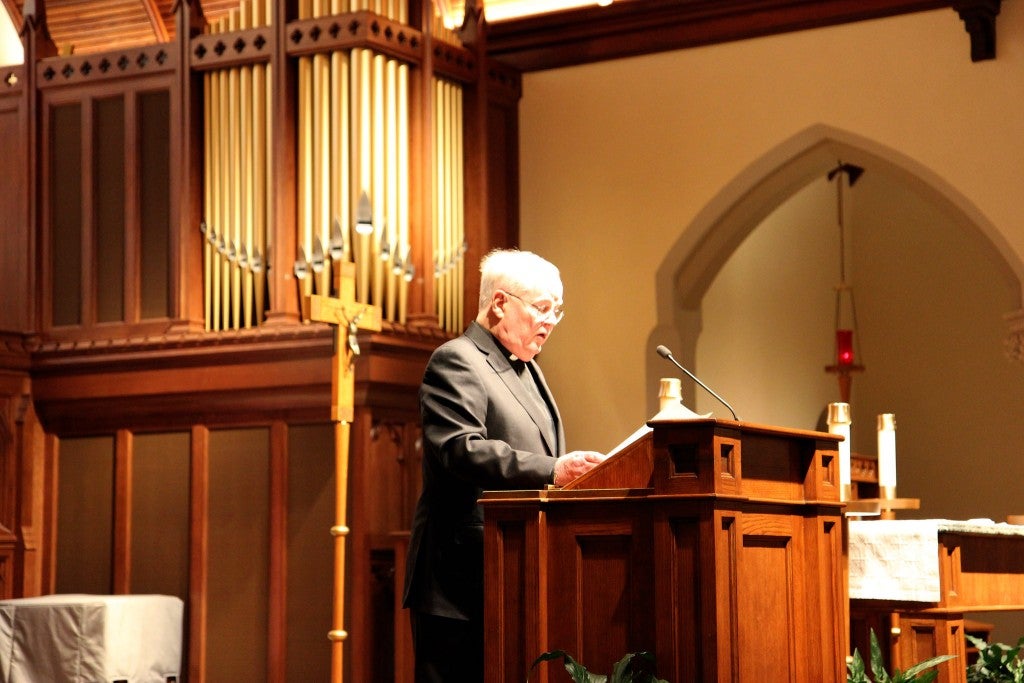A Spirituality of Accompaniment: a Sacred Lecture with Rev. Hollenbach, S.J.
Rev. David Hollenbach, S.J. delivered his lecture on a date that marked two important events. It was the opening of Jesuit Refugee Services’ “Mercy in Motion” campaign, timed to coincide with Pope Francis’s Holy Year of Mercy. Also, it was the 50th anniversary of the close of Vatican II. Georgetown Jesuit Rev. John O’Malley, S.J. is a key historian of Vatican II, and Hollenbach cited O’Malley on the Council’s history-making preference for dialogue. Hollenbach returned to the importance of dialogue throughout his talk, noting that Pope Francis also places particular emphasis on it.
He began with the urgency of the JRS mission, as international migration numbers show that we live in an era of “the highest number of displaced persons ever recorded,” 232 million in 2013. JRS defines its mission with three words: “accompaniment, service, and advocacy.” Because of his theme, Hollenbach spent the most time considering accompaniment, a cornerstone word in the Spiritual Exercises and rich in specific valences for Jesuits.
Accompaniment means being with the people who are being served. For JRS this means being with the refugees on the ground, listening to their stories, and showing them through genuine personal presence that they are not forgotten, even though they have no home. It is—this accompaniment—a kind of friendship: the friendship that leads to a compassionate or merciful recognition that the suffering of the refugee, the suffering of this friend, is my own.
Accompaniment, dialogue, and listening are creative forces that inspire JRS actions, as “[a]ccompaniment… leads to service,” and many refugees report that being truly listened to is the most important thing they receive. Political advocacy that results from this process, for example the anti-landmine campaign leading to the Nobel Prize, is more likely to meet genuine need and less likely to go astray. I thought of much of the criticism leveled at various well-meaning global efforts, such as how funded westerners can overpower the voices and agendas of the poor, or how we can inadvertently create slums and suffering through innocent but misguided attempts to modernize. Hollenbach’s calibration would avoid this by hearing and learning from the served, companioning together over time, and teaming in authentic friendship and appropriate action and advocacy.
Hollenbach particularly engaged me, in my status as word nerd, with Latinate wordplay as he unwound the meanings of three more words: mercy, compassion, and misericordia.
Mercy is another word for compassion—com, with, and passion, or suffering—to be with another in his or her suffering. The etymology of the Latin word for mercy indicates the same spirit. In Latin the word is misericordia. Cor (cordia) means heart, and miser, suffering. Misericordia means to have one’s heart touched by the suffering of another. Thomas Aquinas said that mercy is like friendship, the form of love… that most leads to a compassionate heart. To quote from Thomas Aquinas, ‘[S]ince one who loves another looks upon his friend as another self, he counts his friend’s hurt as his own, so that he grieves for his friend’s hurt just as though he were hurt himself.’ This kind of love is truly com-passion, sharing in the struggle and suffering of another. It is misericordia, mercy, to have one’s heart—cor—touched by the struggles—or misera—faced by one’s friends.
He also highlighted several ministries that are also close to the heart of our experiences at Georgetown. Many of us have visited Jesuit Refugee Services Eastern Africa division in Nairobi, Kenya on past trips that were sponsored jointly by the Center for Social Justice and the Office of Mission and Ministry. Hekima College, the Jesuit-founded school of theology where Fr. Hollenbach has been on the faculty, is also in Nairobi. Some of us teach for St. Louis University through Georgetown for “Jesuit Commons, Higher Education at the Margins” (known as JC-HEM), an online program delivering distance education to refugees in Malawi, Kenya, Syria, and Jordan. Others of us have visited JRS in Amman, Jordan, at one of the most sensitive borders for an influx of Syrian refugees. Hearing him touch on these reminded me of how interlinked we are both here at Georgetown and at all of our sister AJCU campuses to the JRS global agenda.
Hollenbach has close ties to Georgetown, as he taught here, and he received a degree from Woodstock College in Maryland, that was later housed at Georgetown. He is currently a fellow at our Berkeley Center for Religion, Peace, and World Affairs, when he’s not busy with his full-time job as University Chair in Human Rights and International Justice and Director of the Center for Human Rights and International Justice at Boston College. On a more personal Georgetown note, he is also a former professor of Rev. Kevin O’Brien, S.J., Vice President for Mission and Ministry, who gave him such an engaging and warm introduction.

Rev. Kevin O’Brien S.J., Rev. David Hollenbach, S.J., and Georgetown President John DeGioia after the lecture.
Other broad strokes of this talk have been covered well by Georgetown alumna Doris Yu at the Jesuits’ website. The video is both on our website and there. Yu also includes the full text of the lecture. Fr. Hollenbach departed from this text slightly at times, so my quotations above come from the audio, not from the published transcript. Further resources on his work can be found here, courtesy of the Berkeley Center. His book, “The Common Good and Christian Ethics,” can be purchased here through Cambridge University Press.
Written by Carole Sargent, PhD, Director of the Office of Scholarly Publications.
- Tagged
- Catholic
